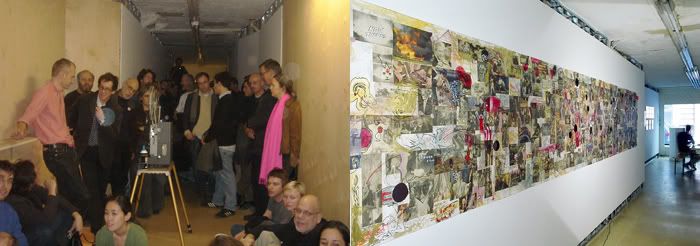On the Occasion of the Passing of Orchard

Orchard Gallery closed its doors on Sunday, May 25, after three years of operation. Don't cry for its demise; the ending was planned from the beginning, was a pre-condition of its founding.
There was a modest brunch of coffee, donuts, bialys and pickles (all purchased from local merchants) and a viewing of the last day of its last show, Spring Wound, a series of video collaborations between filmmaker Jeff Preiss and several of Orchard's founding artists and sympathetic fellow travelers: Andrea Fraser, Nicolás Guagnini, Moyra Davey, Anthony McCall, Josiah McElheny.
There was a modest brunch of coffee, donuts, bialys and pickles (all purchased from local merchants) and a viewing of the last day of its last show, Spring Wound, a series of video collaborations between filmmaker Jeff Preiss and several of Orchard's founding artists and sympathetic fellow travelers: Andrea Fraser, Nicolás Guagnini, Moyra Davey, Anthony McCall, Josiah McElheny.
Gallery director Rebecca Quaytman held court with her dog on her lap, greeting all and sundry, including Jerry Saltz and Roberta Smith, Dara Birnbaum, John Miller, Aura Rosenberg, Stephan Pascher, Anthony Burdin (in town from LA) and many currently or previously exhibiting artists.

An alternative space in the brave new world of the Lower East Side, Orchard was a bare bones storefront, only minimally and periodically renovated to support particular exhibitions and projects. It was the artists' laboratory par excellence. Its passing has already received online coverage, and will undoubtedly merit further discussion in future days. I thought I would weigh in with my own memoir, my remembrance of things and people past.
Colin de Land and his gallery, American Fine Arts, provided a worthy precedent for Orchard. Not just in the overlap of artists, but in the idea of a funky, comfortable, welcoming, unpretentious bohemian hang that is somewhat founded in theoretical or academic concerns. The possibility of conversation, of artist-initiated projects and dialogs, of a looser structure that would yield a tighter critique of the status quo, of a less corporate and polished exterior -- all of this is part of Colin's legacy. He provided a model for art dealing that seems to have sadly disappeared with his passing, with some very few exceptions, especially when considering the white mausoleums metastasizing in the West 20s, where every gesture, every object and every person seems to be instantly scanned, measured and assigned a price by joyless, profit driven automatons in Prada suits. Or do I exaggerate?
Whether or not Orchard ever sold anything, the fact that it was ostensibly organized as a for profit space allowed it to critique the market from within, in the same way that Colin's life and work as a dealer posited an ongoing interrogation of standard operating procedure. Of course there were conflicts at Orchard, infighting and inbreeding, and self aggrandizement. After all, we are dealing with fragile and often fractious artistic egos, and not a small bit of leftist, post-Situationist, post-Baudrillardian, hipper-than-thou academic pretensions. You can still find some of the latter on the same street: just cross Hester catty corner and enter Miguel Abreu Gallery. But as the not so secret seat of LES hip, of post Columbia deconstruction and institutional critique, there was no place like 47 Orchard. R.I.P.


An alternative space in the brave new world of the Lower East Side, Orchard was a bare bones storefront, only minimally and periodically renovated to support particular exhibitions and projects. It was the artists' laboratory par excellence. Its passing has already received online coverage, and will undoubtedly merit further discussion in future days. I thought I would weigh in with my own memoir, my remembrance of things and people past.
Colin de Land and his gallery, American Fine Arts, provided a worthy precedent for Orchard. Not just in the overlap of artists, but in the idea of a funky, comfortable, welcoming, unpretentious bohemian hang that is somewhat founded in theoretical or academic concerns. The possibility of conversation, of artist-initiated projects and dialogs, of a looser structure that would yield a tighter critique of the status quo, of a less corporate and polished exterior -- all of this is part of Colin's legacy. He provided a model for art dealing that seems to have sadly disappeared with his passing, with some very few exceptions, especially when considering the white mausoleums metastasizing in the West 20s, where every gesture, every object and every person seems to be instantly scanned, measured and assigned a price by joyless, profit driven automatons in Prada suits. Or do I exaggerate?
Whether or not Orchard ever sold anything, the fact that it was ostensibly organized as a for profit space allowed it to critique the market from within, in the same way that Colin's life and work as a dealer posited an ongoing interrogation of standard operating procedure. Of course there were conflicts at Orchard, infighting and inbreeding, and self aggrandizement. After all, we are dealing with fragile and often fractious artistic egos, and not a small bit of leftist, post-Situationist, post-Baudrillardian, hipper-than-thou academic pretensions. You can still find some of the latter on the same street: just cross Hester catty corner and enter Miguel Abreu Gallery. But as the not so secret seat of LES hip, of post Columbia deconstruction and institutional critique, there was no place like 47 Orchard. R.I.P.


